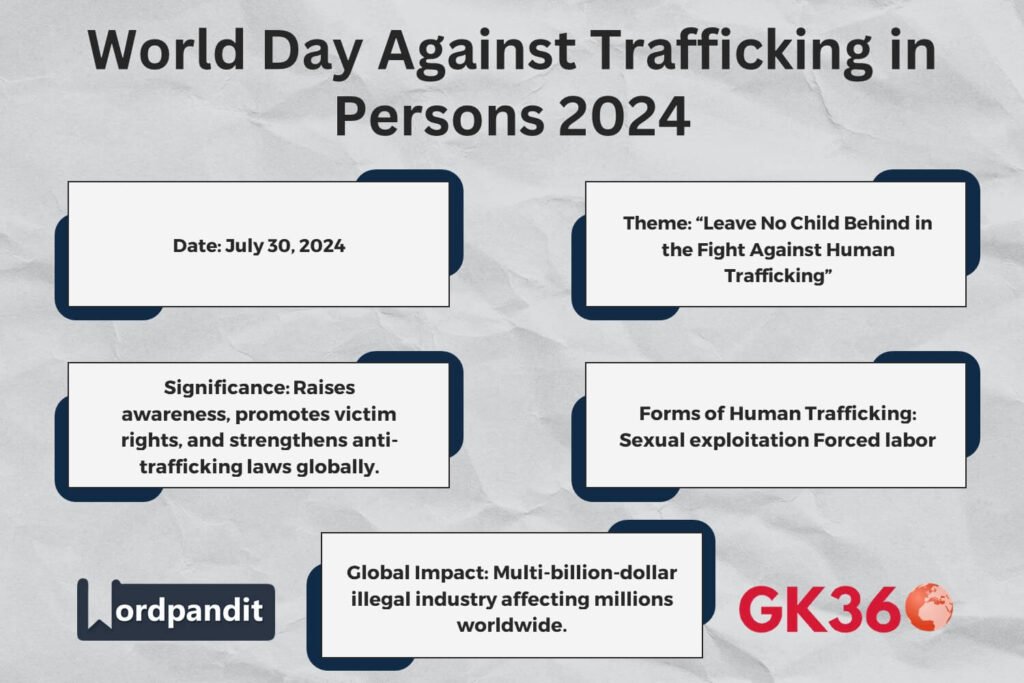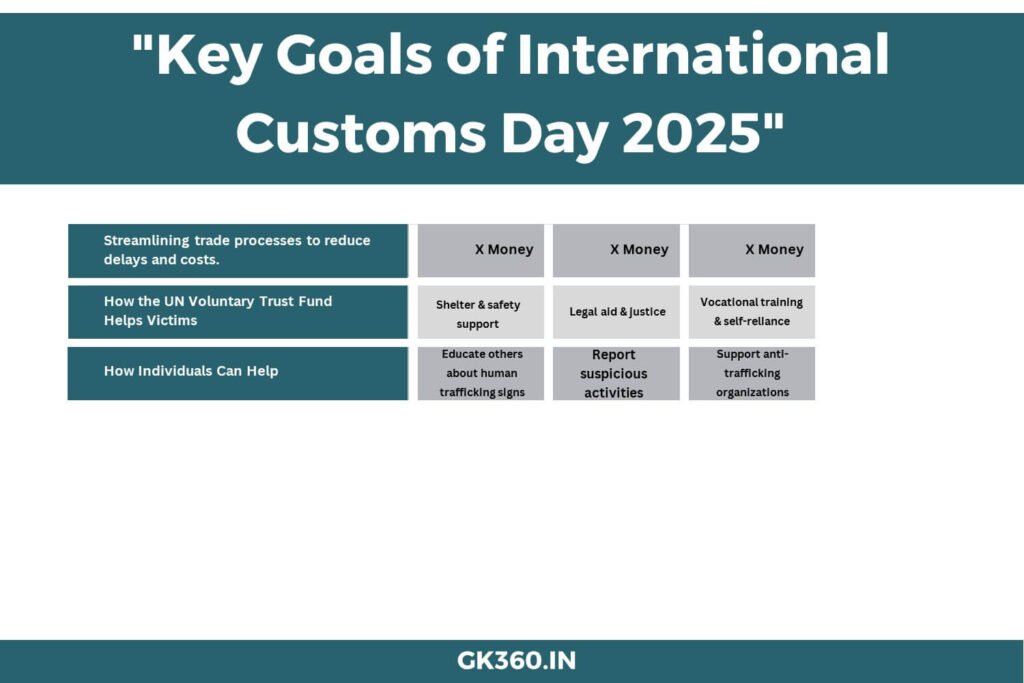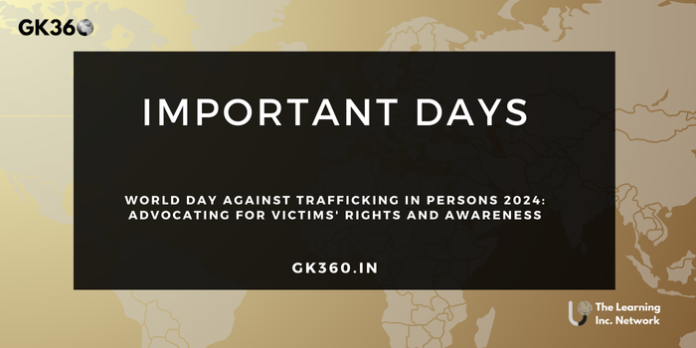World Day Against Trafficking in Persons 2024: Leave No Child Behind
Introduction
Every year on July 30th, the world observes the World Day Against Trafficking in Persons, a solemn reminder of the plight faced by millions trapped in the vicious cycle of human trafficking. This day serves as a crucial platform to raise awareness, advocate for victims’ rights, and reaffirm global commitments to combat this heinous crime.
In 2024, the theme “Leave No Child Behind in the Fight Against Human Trafficking” underscores the urgent need to protect vulnerable children from traffickers and to ensure their holistic rehabilitation and reintegration into society.

Table of Contents
- Understanding Human Trafficking
- Global Efforts and the United Nations’ Role
- The Importance of World Day Against Trafficking in Persons
- The 2024 Theme: “Leave No Child Behind”
- The Role of the United Nations Voluntary Trust Fund
- Continued Challenges and Progress
- FAQ Section
- Conclusion
1. Understanding Human Trafficking
Human trafficking is a grave violation of human rights, encompassing various forms such as:
- Sexual exploitation
- Forced labor
- Organ trafficking
- Child soldiering
Victims, often lured with false promises of better opportunities or coerced through threats and violence, endure unimaginable suffering. This crime fuels a multi-billion-dollar illegal industry that thrives on the vulnerability of victims, making it one of the fastest-growing global crimes.
2. Global Efforts and the United Nations’ Role
In 2010, the United Nations General Assembly adopted the Global Plan of Action to Combat Trafficking in Persons, urging member states to:
- ✅ Prevent trafficking
- ✅ Protect victims
- ✅ Prosecute perpetrators
This framework integrates anti-trafficking measures into broader development and security agendas, recognizing the interconnectedness of human rights, sustainable development, and global security.
3. The Importance of World Day Against Trafficking in Persons
The designation of July 30th as World Day Against Trafficking in Persons through Resolution A/RES/68/192 in 2013 highlights the international community’s commitment to fighting trafficking.
Objectives of the Day:
- 📢 Raising Awareness: Educating the public on trafficking signs and victim rights.
- 📜 Promoting Advocacy: Encouraging governments and organizations to enact protective policies.
- ⚖️ Protecting Victims’ Rights: Ensuring access to justice, rehabilitation, and dignity.
4. The 2024 Theme: “Leave No Child Behind”
The 2024 theme focuses on the vulnerability of children, who are often targeted due to:
- 🔹 Lack of awareness
- 🔹 Economic hardships
- 🔹 Weak legal protection
The theme calls for targeted interventions to protect children, support victims, and empower communities to prevent child trafficking.
5. The Role of the United Nations Voluntary Trust Fund
The UN Voluntary Trust Fund for Victims of Trafficking plays a crucial role in rehabilitating survivors, particularly women and children.
Services Provided by the Fund:
- 🏡 Shelter and safety support
- ⚖️ Legal aid for justice
- 📚 Vocational training for self-reliance
- 💙 Psychological and trauma counseling
6. Continued Challenges and Progress
Despite progress, human trafficking persists due to:
- 🌍 Cross-border criminal networks – Requires stronger international coordination.
- 🆘 Unidentified victims – Improved detection and reporting mechanisms are needed.
- 📈 Poverty and lack of education – Addressing socio-economic factors is key to prevention.
- 💡 Sustainable solutions – Investments in awareness programs and victim rehabilitation.

7. FAQ Section
Q1: What is the significance of World Day Against Trafficking in Persons?
A: It raises awareness about human trafficking, promotes advocacy, and encourages stronger anti-trafficking laws and policies globally.
Q2: What is the theme for World Day Against Trafficking in Persons 2024?
A: The 2024 theme is “Leave No Child Behind in the Fight Against Human Trafficking”, emphasizing child protection and rehabilitation.
Q3: How can individuals help combat human trafficking?
- ✔️ Educate yourself and others about trafficking signs.
- ✔️ Report suspicious activities to authorities.
- ✔️ Support organizations that aid trafficking survivors.
Q4: How does the UN contribute to fighting trafficking?
A: The United Nations leads efforts through policies, financial aid, and global anti-trafficking initiatives, including the UN Voluntary Trust Fund.
Q5: Why are children at greater risk of trafficking?
A: Children are targeted due to economic hardships, lack of awareness, and insufficient legal protection.
8. Conclusion
World Day Against Trafficking in Persons 2024 serves as a global call to action against human trafficking, especially child trafficking. By raising awareness, advocating for victims’ rights, and strengthening international cooperation, we can protect the vulnerable and end this crime.
Let us reaffirm our commitment to ensuring no child is left behind and work towards a future where dignity, justice, and human rights prevail.
Key Takeaways Table
| Aspect | Details |
|---|---|
| Event Name | World Day Against Trafficking in Persons 2024 |
| Date | July 30, 2024 |
| Theme | “Leave No Child Behind in the Fight Against Human Trafficking” |
| UN Initiatives | Global Plan of Action (2010), UN Resolution A/RES/68/192 (2013) |
| Forms of Trafficking | Sexual exploitation, forced labor, organ trafficking, child soldiering |
| UN Trust Fund Support | Shelter, legal aid, vocational training, trauma counseling |
| How to Help | Educate, report trafficking, support survivor organizations |
| Key Challenges | Cross-border crime, unidentified victims, poverty, lack of awareness |
Related terms
- World Day Against Trafficking in Persons 2024 Theme
- UN Global Plan of Action Against Trafficking
- Human Trafficking Awareness and Prevention
- Protecting Children from Human Trafficking
- UN Voluntary Trust Fund for Victims of Trafficking
- Global Efforts to End Human Trafficking
- How to Report Human Trafficking Cases
- Child Trafficking Awareness Campaign 2024
- Role of the UN in Combating Human Trafficking
- Anti-Human Trafficking Strategies 2024





